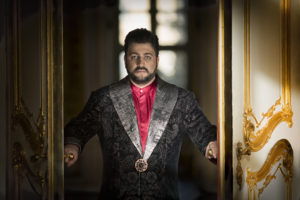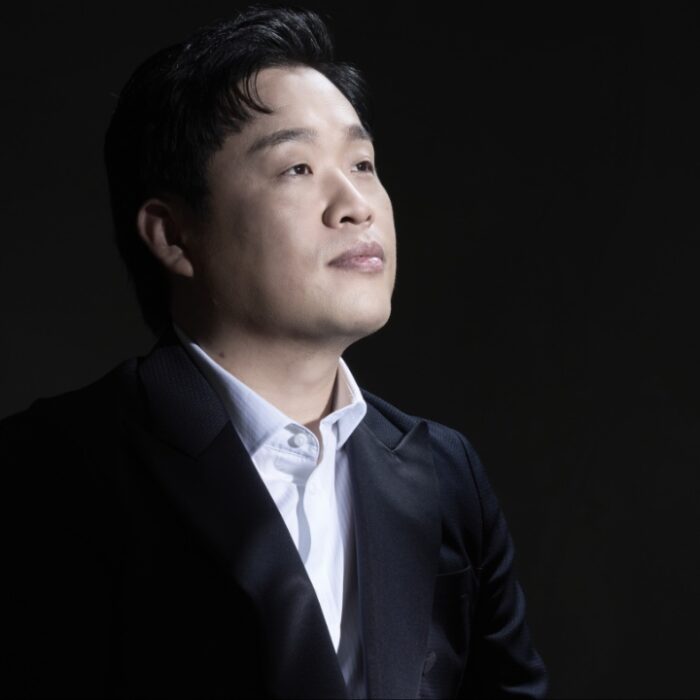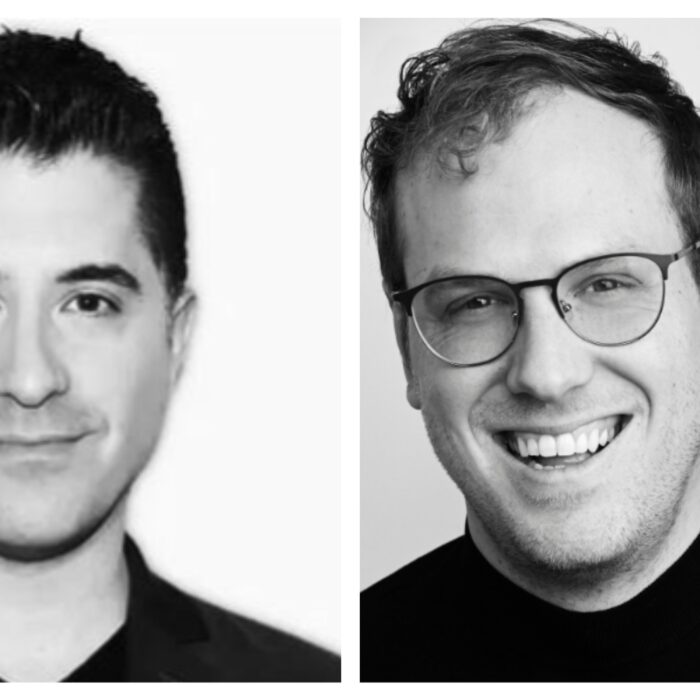
Finding His Voice – Yusif Eyvazov On His Breakout At The Metropolitan Opera & His Never Ending Learning Process
By Francisco SalazarOver the past years, Yusif Eyvazov has skyrocketed onto the opera scene. He has made important debuts in London, New York, Milan, Los Angeles and Berlin and has been part of HD performances, galas, and tours.
“I am happy. I never expected it when I started because you never have any guarantee and this is a dream come true for me,” he said in a recent interview with OperaWire.
His status as a star was sealed this past season after breakouts at La Scala and at the Met but for Eyvazov the work never ends and finding his voice is a continuing journey.
A challenging journey.
An Unexpected Call
This past April, Eyvazov gave arguably his breakout performance at the Metropolitan Opera in the role of Cavaradossi in “Tosca.” The tenor, not originally scheduled to perform, was called in when Marcelo Alvarez canceled. While it signified some important news for the tenor, it also meant cutting short a very much anticipated vacation.
“I started to cry when I got the call because I only had one more week of vacation. You know I had dreamed of a vacation for three weeks because I did three new roles this year and it was three weeks where I was going to be on rest,” Eyvazov noted laughing. “But, I said yes only because of the Metropolitan Opera. I love this theater. I love this public so much. I don’t know if I would have said yes if it was another theater.”
It was Eyvazov’s big return after having made an unexpected debut in 2015 in the role of Calaf in “Turandot,” an experience that while thrilling was also challenging.
“I only had two performances of ‘Turandot’ and it was to replace Fabio Sartori. We didn’t have any rehearsals. When they were rehearsing the production with Marcelo [Alvarez], I was performing ‘Pagliacci’ with Placido [Domingo] in Los Angeles. So I didn’t get a chance to rehearse. And it was so fast. I was taking care of so many things with the orchestra and production. I had stepped on the stage for the first time during the performance. I saw the show the day of the performance. A half-hour before that we walked around to see where I had to move. It was a shock. ”
But with “Tosca” things were a bit different. While there were not as many rehearsals as a revival would have, Eyvazov got a dress rehearsal and he was singing alongside his wife Anna Netrebko, with whom he has performed extensively.
“We had one full orchestra rehearsal, which was full of mistakes and the first performance was okay and the second was good. But the third was great. Little by little you feel free.”
While they did not get to work with Sir David McVicar, who originally directed the production, Eyvazov and Netrebko had the advantage of working with Assistant director Jonathan Loy and were able to create an interpretation that suited them and that was different from the original cast.
“You know it’s not so easy at the beginning because we wanted to keep the original intentions of the director, but it was also about how we felt. So we made some changes. For example, I didn’t throw the painting [in Act one] because it didn’t work.”
The moment referred to by Eyvazov was one in which McVicar had Cavaradossi throw his painting to the ground out of frustration for Tosca’s jealousy. It’s a moment in which you might understand his trying to appease his lover, but also can become confusing when you realize his actions could potentially destroy his own art.
“We had to feel free in the production to do something personal. Otherwise, it would not feel true.”
And the rehearsal time was important as Eyvazov realized the biggest challenge once he got on stage.
“This stage is huge and while I’ve sung Cavaradossi more than other roles, I found that in this production, it’s not so easy. The Met is a huge stage. Now I realized I’m singing and the acoustic is amazing. I understand what I have to do. And next season for ‘Fancuilla,’ I will be more relaxed.”
A Flourishing Career
Eyvazov first came to the international scene in 2014 when he sang at the Teatro dell’Opera di Roma in a high profile production of “Manon Lescaut.” It was Anna Netrebko’s role debut and it was the first time Riccardo Muti and Netrebko were working together. So there was a lot of pressure.
“I was very stressed because of Opera di Roma, Muti, Netrebko. And then I listened to the recording and I realized that I could sing the notes and I finished the performance,” he noted.
But he made a discovery along the way – his voice did not produce the most beautiful color.
“If I don’t like the color of the voice, which you can not change, maybe we can do something to make it acceptable. And I started to work.”
Since that performance, the work has been long and hard and as Eyvazov puts it, “It’s not done. It’s never done. But I am happy that if you listen to ‘Manon Lescaut’ and ‘Tosca,’ it’s two different people singing. And that is beautiful. And you can do it if you work every day.”
Part of Eyvazov’s process is traveling with his two coaches everywhere he goes and taking a day of rest after the performance before getting back to work. “It is always a work-in-progress but it’s always about looking for something new. The process for me is more important for me than the results. Because when you discover something new it’s exciting. And I know that my voice will sound different in four or five years. In the last four or five years, it has changed and the technique and voice is so different.”
For instance for Eyvazov, the performances of “Tosca” at the Met were a discovery. “I found new things in my voice and I have to apply it to ‘Trovatore,'” a role he sings this summer in Paris.
Finding the Voice
With a schedule that is increasingly busy, Eyvazov has become very aware of how to pace himself, especially with the roles he sings. As he noted, unlike lyric tenors who have the advantage of varying up the repertoire and lighter orchestras, a spinto tenor like him has to constantly sing over a heavy orchestra and use a full voice. And Eyvazov is aware this could also shorten his career.
“The singers which sing these roles have a very short singing life because to sing these roles is heavy. You can not go into a performance and save your voice. You have to sing it. You have to practice and when you go on stage you have already sung it 100 times. So when you perform it, you also have to sing it. So you have to use your voice.”
Luckily for him, at this point in his career, he has not had any vocal issues. “I can do this repertoire because I was born to sing these roles. But for some singers who start singing heavy repertoire, the voices can start to get damaged. You have to be very careful. I think I can do that because my voice keeps this tessitura and can do it. If you are not the voice for ‘Trovatore’ you cannot sing ‘Di quella pira’ in the original key. I can still do it because I am young and strong but there will come a time when I start to lower it.”
Part of pacing a spinto voice is choosing the right roles and singing certain one more often than others. This season Eyvazov sang the title role of “Andrea Chénier” and is about to return to Maurizio in “Adriana Lecouvreur.” He also has more Cavaradossi in his schedule, a role he believes is easier to perform than the others.
“‘Adriana Lecouvreur’ and ‘Andrea Chénier’ are more similar. The vocal line is similar. Cavaradossi is much more verismo but the others are closer to bel canto. You can shout Cavaradossi but you can not shout Maurizio or Andrea Chénier. So if a tenor is not in good shape, you will survive Tosca but not ‘Adriana’ or ‘Chénier.’ These two operas ask you for straight beautiful lines. You have to do it or else it will be out of line.”
Maurizio in “Adriana Lecouvreur” is all the more challenging in that it lies lower in the voice as well. “This tessitura is not as high like ‘Il Trovatore’ and that makes it complicated. It’s in between and especially in the last act, you have to find a way to sing a lot of piano, which is very difficult. After shouting for two hours you have to sing soft.”
However, that does not mean experimenting is out of the question.
“I think if you are not afraid to experiment you will win. I arrived to that point in my life when I say I have two possibilities. I will lose my voice or I will do something with my voice. There is no other chance. You either trust yourself and you risk. After singing so many of these roles, I realized my voice is for this repertoire but I need to find a way to sing it and make it mine.”
Coming Soon
As his season continues Eyvazov embarks on new adventures from the World Cup to a tour of Latin America, a first and one that he admits being excited for.
“It is my first time in Latin America and I am very excited. The food is supposed to be fantastic,” he revealed.
While on tour, he will engage in a series of performances alongside Netrebko.
“The people that live there, they love things like ‘Nessun dorma,’ ‘Vissi d’arte,’ ‘O Sole Mio,’ and ‘ Vesti la giubba.’ So this program will be fun and popular. We know what they want.”
Along the way Eyvazov is also hoping to try out new repertoire, including the duet from “Madama Butterfly” and “La Fanciulla del West.”
After a season full of excitement Eyvazov is looking forward to many future projects. In particular, he can’t wait to sing with Maestro Pappano, who will conduct him in his role debut as Alvaro in “La Forza del Destino.”
“He is amazing. I really think Pappano will give me a lot. He is a great musician and he is a great human being. He loves singers and it’s not always like that. He doesn’t have a personal ego and he will work with you for two hours in his office and explain everything. I am looking forward to this more than anything else.”
He is also looking forward to Dick Johnson at the Metropolitan Opera, which will also be a new role. But this time around Eyvazov will get the full Met experience with full rehearsals and staging. The opera will also allow him to explore another side of Puccini, which is very different from the roles he usually sings.
“It’s very American. And I love it. I think Puccini wrote ‘Fanciulla’ in a very American way and it’s so great to perform it here. It fits perfectly. Dick Johnson is a very complicated person and his vocal line is really not too big like Des Grieux, but it’s not easy.”
He also notes that the role will pose new physical challenges. “I will work a lot on how to act it because Dick Johnson is a young man and cowboy, so I have to do something unique.”
The Future
As Eyvazov’s profile grows, he hopes to also expand his repertoire and return to roles he before. For one he revealed that he will get to repeat “Otello” with Valery Gergiev and he also noted that he expects to sing Don José in “Carmen.”
Surprisingly, Eyvazov noted that many artistic directors think he would be correct for Wagner. “I will sing some Wagner in the future because I need time to learn it. I am interested to see how it sits in my voice. Many artistic directors believe my voice will sound good in the music. I don’t know and I am not very familiar with the music.”
But there is one role that he wants to repeat after having made his role debut this season – Hermann in “The Queen of Spades.”
“After singing it I can assure you that I love it and it is my favorite role.”


